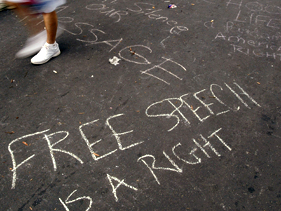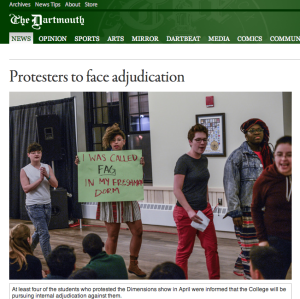A Real Recipe for Disaster-Suppress Student Voices
Recently there have been some disturbing stories in the news. After last year with the incidents with the Occupy student protesters at Berkeley and Davis, you’d think that colleges would have learned that bad reactions to student frustration elicits a stronger reaction than the protests themselves.
Nope.
In a time where some educators and former student activists lament the apathy of this generation in America, some schools are using their campus judicial system to punish students who are protesting actions by the Boards or what they see as insufficient action by administration. Using the system in that way is dangerous because it stifles the voice of the leaders of the new generation, sets a precedent that will silence student voices for years to come, and completely undermines the credibility of the judicial system itself. To be fair, the student protesters may have technically violated the rules regarding protests or trespass or embarrassed the school at key times, but the solution to these violations is creating a “teachable moment” and not creating a disciplinary record that may keep them out of graduate schools, deny them employment, prohibit them from getting government clearance, and keep a record in the judicial office for years after they graduate. While the students’ choice of methods may be unfortunate, using the campus judicial system against them violates the entire that system, not to mention completely invalidates the school’s attempt to develop leaders.
A good campus judicial system is supposed to be an educational response to violations of the values and expectations of the campus community. Since that is a fairly nebulous concept, rules are put in place that are meant to reflect those values and/or ensure the health
 and safety of the campus community as a whole. A good system also allows administrative discretion to make sure that people aren’t using the nuclear option against students when diplomacy would work. It is that aspect that has failed here, and I cannot believe that the failure is accidental.
and safety of the campus community as a whole. A good system also allows administrative discretion to make sure that people aren’t using the nuclear option against students when diplomacy would work. It is that aspect that has failed here, and I cannot believe that the failure is accidental.
One of the most amazing experiences you can have as an educator is watching as a student realizes that he or she can make a difference. Schools almost universally establish co-curricular goals of giving students the tools they need to become leaders, critical thinkers, and problem solvers. Schools have offices dedicated to leadership development, entrepreneurship, and service learning to help train those students passionate about making change in their local or global community, and to inspire others to become so. Unfortunately, to today’s generation, the idea of a metaphorical “suggestion box” just isn’t good enough. In a world where you can use social media to directly connect with Donald Trump, Lady Gaga, President Obama, and Speaker Boehner, having to walk up the chain of command is seen as slow, unnecessarily complex, inefficient, and simply not good enough. This is especially true if the issue involves social justice, ethics, or what is viewed as recurring or imminent harm. On the one hand, it is important that passionate students be taught effective ways to voice their displeasure, engage the help of the right people, and do it in a way that allows change to occur. Administrators might argue that the students are being punished because they went outside of the accepted methods of protest and created a disruption that was unacceptable, and perhaps did so without trying to accomplish things the “right”way first. With all due respect, that is a terrible reason to actually punish students.
The simple fact is that schools are, in many ways, a business. Their “widget” is education and it is an amazingly valuable widget that I love, but it is a widget nonetheless. There are some schools that do a great job walking the line between corporate thinking and the ivory tower ideas of the past, but many of them do not have that luxury. Some schools have placed people in upper administration that are business people first and educators a distant second, if at all. So the administrative hierarchy is filled with more red tape and obstacles at a time when society is tearing those down. This has made it very difficult for students to find consistency and transparency, and has actually increased the frustration many of them feel. While a school should want even the most frustrated students to voice their concerns the “right” way, if students do not feel that those ways work, there has to be an awareness by those schools that the student perception is at least partially their fault.
If students identify what they see is a problem and they try to work to resolve that problem with little or no success, what do we want them to do? What would a leader do? Once that group has spoken to the right people and been told that “their concerns are noted and appreciated” but the looming deadline to affect change approaches, how are they supposed to ensure that they are not simply put off until the subject of their concern has already taken place. Cooper Union, for example, will be charging tuition for the first time ever and that was a done deal before the first student or alumnae could raise her voice.
In a time where most good people object quietly to the injustices they feel, we have the opportunity to raise a group of change agents willing to take vocal stands against those same injustices. We may not agree with them, we may not like their positions, and we may  not approve of their methods, but we sure as hell should not actively silence them. Silencing discontent does not eliminate the problem; it exacerbates it. The global community is full of those examples—Turkey, Egypt, Syria, China, etc. When you stifle one voice aggressively those people who were simply content to watch start choosing sides, and the last thing an administration wants are students that lose faith in their ability to advocate for them. It’s simple—if the administration does not have the students’ back, the students will cut administration out of their process.
not approve of their methods, but we sure as hell should not actively silence them. Silencing discontent does not eliminate the problem; it exacerbates it. The global community is full of those examples—Turkey, Egypt, Syria, China, etc. When you stifle one voice aggressively those people who were simply content to watch start choosing sides, and the last thing an administration wants are students that lose faith in their ability to advocate for them. It’s simple—if the administration does not have the students’ back, the students will cut administration out of their process.
Now, I am in no way saying that any student action should be accepted without consequence. There are clearly things that a dissatisfied student could do that not only should be addressed swiftly and severely, but must be. However, as long as the student actions do not impact the ability of other students to pursue their own interests using the campus judicial system is the wrong response. Yes, in other countries or in the streets of this country a protester can expect to face some sort of legal consequence, but college campuses should be different. In the long run, disciplinary probation will not be a big deal to most people, but students do not know that. Most students believe that being on probation will hurt them down the road, and every administrator knows that belief exists. If the students punished in these cases don’t care about being put on probation, you can bet the administration knows that other students will. Punishing these students is more about making sure that any future student who gets frustrated to the point of taking action thinks twice. Administrators know that many of them will simply suffer in silence thinking that the risk isn’t worth it, and that they will therefore not have to deal with these types of situations in the future.
If colleges do not encourage students to vocalize dissent, there will literally be no place left that does.
What do you think? What should students do if they feel that they are being ignored or simply being paid lip service? What should colleges do to reinforce the idea that there are “right” ways to do things?
I should also say that if you are in trouble for protesting at your college, we will help you navigate your judicial process for 30% off our normal prices. Keep fighting the good fight.
